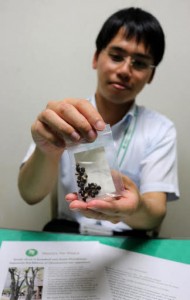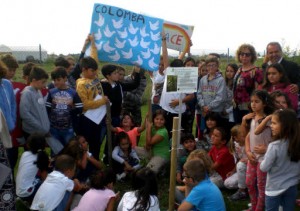119 cities have received seeds and saplings of A-bombed trees from Mayors for Peace over past five years
Jun. 19, 2017
by Miho Kuwajima, Staff Writer
Five years has passed since Mayors for Peace, an organization headed by Hiroshima Mayor Kazumi Matsui, began an effort to distribute to member cities and others the second-generation seeds and saplings from trees that survived the atomic bombing. So far, these seeds and saplings have been planted in 119 cities in Japan and 15 other nations. Through the newsletter it emails to member cities, it is seeking more cities that are interested in taking part in this project. However, the project’s larger aims are a long-term effort because time and energy are needed to transport the seeds and saplings from Hiroshima and grow them after that, and, in addition, awareness of this campaign is still limited.
In May 2012, the first seedling was presented to Ieper, Belgium, the vice-chair city of the organization. Ieper is a city where chemical weapons were used widely for the first time in World War I. In 2013, the tree-planting project was included in Mayor for Peace’s five-year action plan, and 33 cities in Europe and North America received seeds or saplings grown from A-bomb survivor trees such as ginkgo, camphor, and Japanese hackberry trees. Many of the recipient cities are located in Europe, including Sarajevo, the capital of Bosnia and Herzegovina which endured a civil war.
Some cities are taking advantage of the donated trees to promote peace education activities or peace-related events. Cervia, a city located in northeast Italy, has planted a seedling grown from the offspring of a ginkgo tree, which survived the atomic bombing, at a park in the city in conjunction with the 70th anniversary of the atomic bombing. Cervia has put substantial efforts into conveying a message of peace throughout the city. Children from the elementary school near the park are taking care of the little tree and learning about the importance of creating a peaceful world. Luca Coffari, the mayor of Cervia, provided the Chugoku Shimbun with a written comment, saying, “Planting the ginkgo tree in a park next to a primary school, where boys and girls are educated, is a symbol of the fact that our city values freedom, democracy, and respect for the dignity of all people, and recognizes that peace is a fundamental right of people all over the world.”
When it comes to cities in Japan, the offspring of the A-bomb survivor trees, primarily Chinese parasol trees, have been planted in 86 member cities including Kunitachi, Tokyo, which planted a second-generation sapling from an A-bombed Chinese parasol tree near the city office this month.
Although the action plan for the project does not define a target for the number of seeds and saplings to distribute, as of June 1, just 1.6% of the 7,355 member cities in 162 nations including Japan have planted the offspring of A-bombed trees. Progress is particularly slow in places outside Japan because the regulations on importing plants differ from country to country, resulting in time-consuming procedures and quarantine measures. Currently, in most cases, only seeds are being shipped overseas. In addition, it is necessary to secure a site to plant the seed or sapling and arrange for people to properly tend to it.
To pursue this project, Mayors for Peace is collaborating with the Green Legacy Hiroshima (GLH) Initiative, a citizens’ group in Naka Ward which is working to preserve the A-bomb survivor trees and distribute their seeds and seedlings. GLH has been collecting seeds from the trees that survived the atomic bombing in the area within two kilometers of the hypocenter. Chikara Horiguchi, 72, a tree doctor and GLH member who lives in Nishi Ward, maintains the seeds and seedlings with the cooperation of the Hiroshima Botanical Garden.
Mr. Horiguchi said, “As the A-bomb survivors grow older, the trees which survived the A-bombing will be of even greater value. I think the message that the tragic experience of the bombing must never be repeated should be spread around the world through these trees.” Mayors for Peace has allocated 760,000 yen as the annual budget for this project. There are also calls for the City of Hiroshima, which oversees Mayors for Peace, to provide the project with more assistance.
(Originally published on June 19, 2017)
Five years has passed since Mayors for Peace, an organization headed by Hiroshima Mayor Kazumi Matsui, began an effort to distribute to member cities and others the second-generation seeds and saplings from trees that survived the atomic bombing. So far, these seeds and saplings have been planted in 119 cities in Japan and 15 other nations. Through the newsletter it emails to member cities, it is seeking more cities that are interested in taking part in this project. However, the project’s larger aims are a long-term effort because time and energy are needed to transport the seeds and saplings from Hiroshima and grow them after that, and, in addition, awareness of this campaign is still limited.
In May 2012, the first seedling was presented to Ieper, Belgium, the vice-chair city of the organization. Ieper is a city where chemical weapons were used widely for the first time in World War I. In 2013, the tree-planting project was included in Mayor for Peace’s five-year action plan, and 33 cities in Europe and North America received seeds or saplings grown from A-bomb survivor trees such as ginkgo, camphor, and Japanese hackberry trees. Many of the recipient cities are located in Europe, including Sarajevo, the capital of Bosnia and Herzegovina which endured a civil war.
Some cities are taking advantage of the donated trees to promote peace education activities or peace-related events. Cervia, a city located in northeast Italy, has planted a seedling grown from the offspring of a ginkgo tree, which survived the atomic bombing, at a park in the city in conjunction with the 70th anniversary of the atomic bombing. Cervia has put substantial efforts into conveying a message of peace throughout the city. Children from the elementary school near the park are taking care of the little tree and learning about the importance of creating a peaceful world. Luca Coffari, the mayor of Cervia, provided the Chugoku Shimbun with a written comment, saying, “Planting the ginkgo tree in a park next to a primary school, where boys and girls are educated, is a symbol of the fact that our city values freedom, democracy, and respect for the dignity of all people, and recognizes that peace is a fundamental right of people all over the world.”
When it comes to cities in Japan, the offspring of the A-bomb survivor trees, primarily Chinese parasol trees, have been planted in 86 member cities including Kunitachi, Tokyo, which planted a second-generation sapling from an A-bombed Chinese parasol tree near the city office this month.
Although the action plan for the project does not define a target for the number of seeds and saplings to distribute, as of June 1, just 1.6% of the 7,355 member cities in 162 nations including Japan have planted the offspring of A-bombed trees. Progress is particularly slow in places outside Japan because the regulations on importing plants differ from country to country, resulting in time-consuming procedures and quarantine measures. Currently, in most cases, only seeds are being shipped overseas. In addition, it is necessary to secure a site to plant the seed or sapling and arrange for people to properly tend to it.
To pursue this project, Mayors for Peace is collaborating with the Green Legacy Hiroshima (GLH) Initiative, a citizens’ group in Naka Ward which is working to preserve the A-bomb survivor trees and distribute their seeds and seedlings. GLH has been collecting seeds from the trees that survived the atomic bombing in the area within two kilometers of the hypocenter. Chikara Horiguchi, 72, a tree doctor and GLH member who lives in Nishi Ward, maintains the seeds and seedlings with the cooperation of the Hiroshima Botanical Garden.
Mr. Horiguchi said, “As the A-bomb survivors grow older, the trees which survived the A-bombing will be of even greater value. I think the message that the tragic experience of the bombing must never be repeated should be spread around the world through these trees.” Mayors for Peace has allocated 760,000 yen as the annual budget for this project. There are also calls for the City of Hiroshima, which oversees Mayors for Peace, to provide the project with more assistance.
(Originally published on June 19, 2017)









